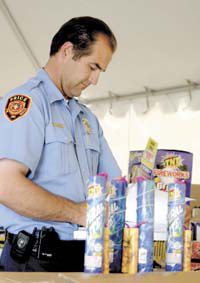| Chief Paul Bedont inspects the inventory at a fireworks stand on Main Street in Price. All locations selling the pyrotechnic devices must be inspected by local fire authorities to ensure that state guidelines are met. Bedont inspected the Price location, making sure items such as exits, lighting and tent materials were up to standards. In addition, he checked the inventory to make sure the location was selling only state-approved fireworks. |
Fireworks have always been associated with Independence Day and Pioneer Day. But Carbon County residents should beware of the risks involved in improperly using fireworks.
Local fire departments respond to numerous emergency situations and injuries resulting from improper use of the pyrotechnic devices, pointed out Price Chief Paul Bedont. All of the injuries and fires are preventable.
Recently, there were several homes threatened and many acres of brush destroyed when a resident of Kenilworth reportedly chose to discharge illegal fireworks, indicated Bedont. The fire could have gotten out of control and caused thousands of dollars in damage.
In recent years, fireworks have been one of the leading causes of injuries which were serious enough to require hospital emergency room treatment, continued Bedont.
Fireworks can result in severe burns, scars or even death. The injuries typically harm the eyes, head or hands and are mostly reported in states where fireworks are legal. Even sparklers reach temperatures of more than 1,000 degrees Fahrenheit.
Based on the amount of time and quantities in use, the pyrotechnic devices pose a higher risk of fire death than any consumer product, stressed Bedont.
Cigarettes are the leading cause of fire death. But the risk that someone will die when fireworks are being used is three times the corresponding risk when cigarettes are burning.
On a typical July 4th holiday, the pyrotechnic devices cause more outdoor fires in the United States than all other causes of outdoor fire combined.
Open areas, homes and even automobiles have become engulfed in flames because of fireworks, noted Bedont
In 2003, there was an estimated $58 million in damage and five deaths associated with fireworks in the U.S. In 2004, an estimated 18,900 firework fires caused approximately $21.8 million in property loss alone.
Fire conditions in Carbon County are at extremely dangerous levels and extreme caution should be used if residents discharge fireworks, stressed Bedont.
Residents who choose to purchase illegal fireworks could receive costly citations.
Last year the Price City Fire Department responded to several reports of illegal pyrotechnic devices landing on top of homes. Fortunately, there was no serious damage to the homes, but the risk to homes and people was unwarranted.
Bedont offered a basic overview of the laws governing fireworks in Utah.
Approved class C common fireworks may be legally sold after June 19 and before July 26, after Dec. 19 and before Jan. 3rd ; and 15 days before and on Chinese New Year.
Approved class C common fireworks can be legally discharged three days before, on the day of, and three days after the following: July 4, July 24, Jan. 1, Chinese New Year.
Only approved class C common fireworks may be purchased and ignited. While there are thousands of approved fireworks, they all have a few things in common. First, they do not explode or leave the ground. Second, their sparks reach a maximum height of 15 feet. Third, they are legally sold in Utah. Any other fireworks that are used within the state are illegal.
Unapproved class C dangerous explosives are illegal to sell, purchase, possess or discharge in Utah. Only state licensed fireworks display operators are permitted to sell, purchase, possess or discharge dangerous class C explosives.
Dangerous class C explosives have the following characteristics:
•Firecrackers, cherry bombs or other similar explosive.
•Skyrockets or bottle rockets (other than a model rocket) which uses combustible materials and rises more than 15 feet when discharged.
•Aerial fireworks which propel comets, shells, salutes, flash shells or similar devices more than 15 feet into the air.
•Chasers, whistlers, or other device that darts or travels more than 10 feet laterally on a smooth surface or exceeds 15 feet in height when discharged.
•These kinds of fireworks are generally purchased outside of Utah and illegally transported into the state.
Violation of any of these laws is a class B misdemeanor and can result in hefty fines and or jail time. Anyone discharging fireworks, whether legal or not, can also be held liable for any damages which occur as a result of their discharge of fireworks.
This year the local police agencies will be working closely with fire officials to control the use of illegal fireworks, and there will be little tolerance for illegal or negligent use due to the dry conditions.
The best way to enjoy fireworks is to visit public fireworks displays put on by professionals who are licensed and know how to safely handle fireworks. Fireworks displays will take place in Scofield on Saturday night and at the Carbon County Fairgrounds on July 4.
Here are a few fireworks safety tips so legal fireworks can be more enjoyable.
•For those doing their own fireworks, never light fireworks indoors or near fields or open areas with dry brush.
•Always have a bucket of water, hose line and/or a fire extinguisher nearby. Know how to properly operate the fire extinguisher.
•Do not wear loose clothing while using fireworks, sparks can easily fall under clothing and cause your clothes to burn.
•Stand several feet away from lighted fireworks. If fireworks do not go off, do not stand over them to investigate; douse them with water and carefully dispose of them.
•Occasionally fireworks malfunction, so take precautions to protect your eyes.
•Always read the directions and warning labels on fireworks. If the fireworks are not marked with the contents, directions and warning labels, do not light them.
•Supervise children around fireworks at all times.

